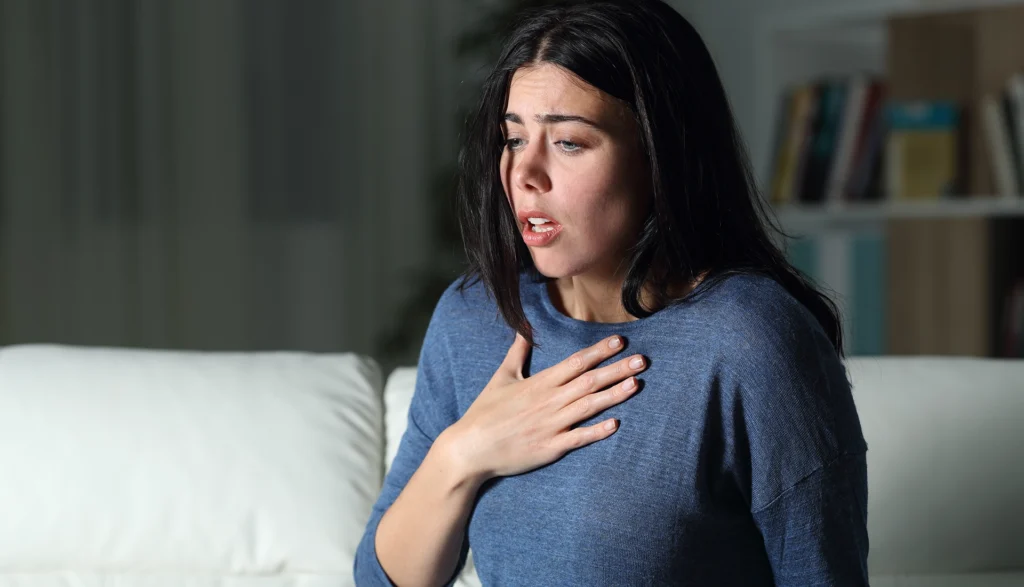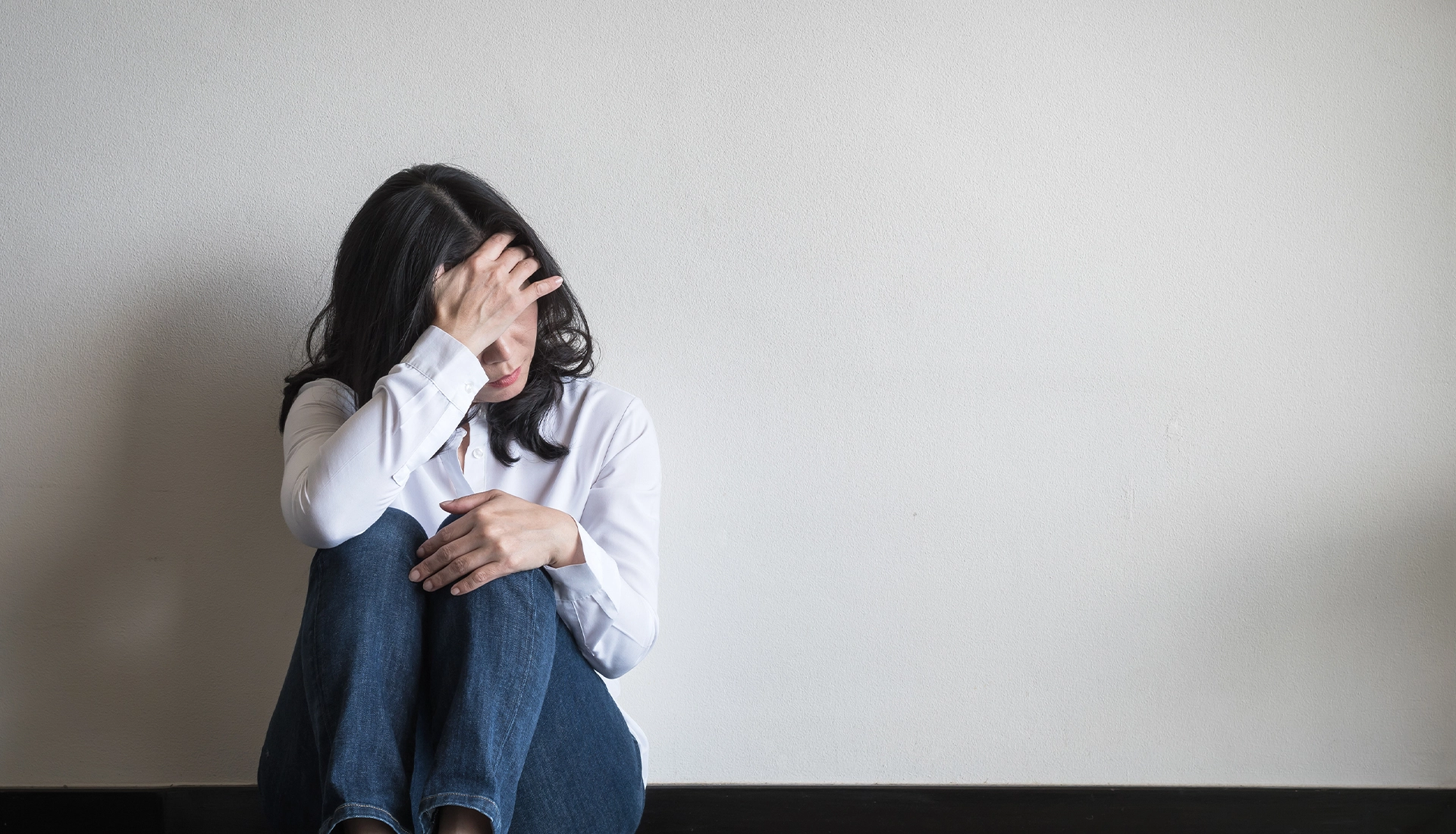What is anxiety? Anxiety is a common feeling of worry, nervousness, or fear that can be mild or severe. Unlike normal worry, anxiety often happens without a clear reason and can disrupt daily life. In this article, you’ll learn about what anxiety is, its symptoms, and how it differs from anxiety disorders.
Key Takeaways
- Anxiety is a complex emotional response characterized by feelings of unease, worry, and fear, which can range from mild to severe and lead to anxiety disorders when persistent.
- Anxiety disorders encompass various conditions, including Generalized Anxiety Disorder, Social Anxiety Disorder, and Specific Phobias, each significantly impacting daily functioning and quality of life.
- Effective management of anxiety involves a combination of therapy, medication, support groups, and stress management techniques, tailored to individual needs.
Defining Anxiety
Anxiety is often described as a feeling of tension or apprehension arising from the expectation of actual danger, whether that danger is perceived threat as internal or external. Unlike fear, which is a reaction to a recognized threat, anxiety can occur even when such a threat is not clearly justified. This state involves feelings of unease, worry, or fear, with its intensity ranging from mild to severe. Many individuals experience anxiety, and differentiating between occasional anxiety and the persistent, overwhelming anxiety of disorders is essential.
The body’s natural response to anxiety is the ‘fight or flight’ mechanism, an evolutionary trait designed to protect us from potential threats. This response prepares the body to either confront or flee from danger, manifesting in physical symptoms like increased heart rate, rapid heartbeat, and heightened alertness. While this response is beneficial in genuine danger situations, it can be problematic when triggered by everyday stressors.
Anxiety, in its beneficial form, can serve as a motivating force, pushing us to meet deadlines and avoid harmful situations. However, when anxiety becomes intense, excessive, and persistent, it transitions into what is known as an anxiety disorder. This excessive anxiety can worsen anxiety and interferes with daily life, making it challenging to function normally.
Recognizing when anxiety transitions into a disorder is essential. While everyone experiences anxiety, it’s the chronic, unrelenting worry and fear that characterize anxiety disorders. Recognizing these differences is the first step toward seeking help and finding effective treatments.
Types of Anxiety Disorders
Anxiety disorders encompass a range of mental health conditions, each with its own specific characteristics and triggers. Characterized by excessive, persistent, and often irrational fear or worry, these disorders disrupt daily life and can be related to other anxiety disorders and other mental health disorders. Despite their differences, all anxiety disorders tend to share a common thread: they significantly impact the individual’s ability to function normally, especially when considering any underlying health condition and the symptoms of anxiety disorders.
Generalized Anxiety Disorder (GAD) is one of the most common types, characterized by chronic worry that disrupts daily functioning. Individuals with GAD often find it difficult to control their anxious thoughts, which can span various aspects of their lives. This constant state of worry can be exhausting and overwhelming, making it hard to focus on everyday tasks and leading to trouble concentrating.
Social Anxiety Disorder (SAD) involves a significant fear of social situations where one might feel embarrassed or judged. This intense fear can lead to avoidance of social interaction, impacting personal and professional relationships and overall social functioning. Individuals with SAD may find everyday social interactions become sources of extreme anxiety and stress, often due to social phobia.
Separation Anxiety Disorder and Selective Mutism are other notable types. Separation Anxiety Disorder manifests as intense fear or anxiety about separation from attachment figures, often seen in children but can also affect adults. Selective Mutism, typically affecting children, is characterized by the inability to speak in certain social settings despite being able to talk in others.
Specific phobias involve an intense, irrational fear of specific objects or situations that are generally harmless, such as heights or spiders. The main types include:
- Specific Phobias: Intense, irrational fear of specific objects or situations that are generally harmless (e.g., heights, spiders).
- Panic Disorder: Unexpected panic attacks causing overwhelming fear and physical symptoms like heart palpitations. Many who experience panic attacks may feel fear in situations that trigger their anxiety.
- Agoraphobia: Fear of being in places where escape might be difficult, leading to avoidance of such situations.
Understanding these various types of anxiety disorders helps in recognizing the specific challenges each one presents.
Common Symptoms
Anxiety can manifest in various ways, often presenting both physical and emotional symptoms that can significantly impact an individual’s well-being. Identifying these symptoms is key for effective diagnosis and treatment.
One of the most common physical symptoms of anxiety is an increased heart rate, often accompanied by rapid breathing. These different symptoms are part of the body’s ‘fight or flight’ response, preparing it to respond to potential threats. Other prevalent physical symptoms include:
- Muscle tension, often leading to aches and pains
- Sweating
- Trembling
- Gastrointestinal issues like nausea
- Anxiety signs
Emotionally, anxiety can manifest as feelings of nervousness, restlessness, or tension. Individuals may experience a constant feeling of dread or impending danger, even when there is no clear threat. These emotional symptoms can make one feel anxious and can be just as debilitating as the physical conditions, affecting one’s ability to enjoy life and engage in activities.
The impact of anxiety symptoms on daily life cannot be understated. From disrupting sleep to impairing concentration and job performance, the effects are far-reaching. Identifying both the physical and emotional symptoms of anxiety is crucial for seeking appropriate help and finding effective treatment strategies.

Causes and Risk Factors
The causes of anxiety disorders are multifaceted, involving a combination of genetic, environmental, and psychological factors. Knowing these causes and risk factors aids in both prevention and treatment.
Genetic predisposition plays a significant role, with anxiety disorders often running in families. This suggests that inherited traits can trigger anxiety disorders, indicating a strong genetic component. Additionally, neurotransmitter imbalances, particularly involving norepinephrine and serotonin, can influence anxiety levels.
Environmental factors that contribute to the development of anxiety disorders include:
- Long-term stress, which can disrupt mood-regulating neurotransmitters, leading to chronic anxiety and an increased risk of developing anxiety.
- Traumatic events experienced in childhood or adulthood, acting as significant triggers.
- Chronic stress or exposure to violence, which increase the likelihood of developing anxiety.
Psychological factors, such as repressed emotions or internal conflicts, can also lead to anxiety. These internal struggles can manifest as anxiety when the individual is unable to address or resolve them. Understanding the various causes and risk factors is crucial for developing effective treatment plans tailored to the individual’s needs.
Diagnosis of Anxiety Disorders
Diagnosing anxiety disorders involves a comprehensive evaluation by a mental health professional to diagnose anxiety disorders, as outlined by the American Psychiatric Association. This process is essential for developing an effective treatment plan.
Doctors often start by assessing whether the anxiety may be connected to a medical cause, ordering tests to look for signs of a problem. This step is vital for ruling out other health conditions contributing to anxiety symptoms.
Psychological evaluations play a crucial role in the diagnosis process. These evaluations consist of inquiries about the medical history of symptoms, their severity, and their impact on daily life. Questionnaires are often used to supplement these evaluations, providing a more detailed picture of the individual’s condition.
Once the evaluation is complete, healthcare providers discuss the diagnosis and treatment strategies with the patient during feedback sessions. This collaborative approach keeps the patient informed and involved in their treatment plan, increasing the likelihood of successful outcomes.
Treatment Options
There are various treatment options available for anxiety disorders, each tailored to the specific needs of the individual. At Back Bay Mental Health, a range of therapeutic approaches and programs are offered to support individuals struggling with anxiety.
Therapies like Acceptance and Commitment Therapy (ACT) and Dialectical Behavior Therapy (DBT) are designed to help individuals manage anxiety. These therapies focus on helping individuals accept their anxiety rather than fighting it, teaching them skills to cope more effectively through talk therapy.
The Intensive Outpatient Program (IOP) at Back Bay Mental Health is tailored to support individuals dealing with anxiety and other mental health challenges. This program provides a structured environment where individuals can receive intensive treatment while still maintaining their daily responsibilities.
Medications, including certain antidepressants and anti-anxiety drugs, are often prescribed based on the specific type of anxiety disorder and any accompanying health issues. Medication management is available at Back Bay Mental Health to help clients effectively manage their anxiety symptoms.
Support groups offer a platform for individuals with anxiety to share experiences and find encouragement from others facing similar challenges. A support group can provide valuable insights and camaraderie. Relaxation techniques like meditation and yoga can significantly alleviate anxiety symptoms, offering practical tools for management.
Finding the right treatment is a personal journey, and it often involves a combination of therapies and support systems. At Back Bay Mental Health, we are committed to helping individuals find the most effective treatment strategies for their unique needs.
Managing Anxiety in Daily Life
Managing anxiety in daily life requires a proactive approach and the implementation of practical strategies in everyday situations. Identifying specific triggers that increase anxiety aids significantly in managing stress responses.
Keeping a journal is an effective way to identify stressors and develop coping strategies. Tracking anxiety levels and their triggers can provide insights into patterns, helping to develop more effective management strategies.
Stress management techniques, such as meditation and yoga, can significantly alleviate anxiety symptoms. These techniques help in calming the mind and reducing the physical symptoms of anxiety, making it easier to handle stressors.
The location of Back Bay Mental Health is conveniently near public transportation, making it easily accessible for clients seeking mental health support. This accessibility ensures that individuals can receive the help they need without additional stress.
How Back Bay Mental Health Can Help
Back Bay Mental Health offers a range of human services to assist individuals struggling with mental health issues. Flexible treatment options accommodate the busy schedules of students and professionals in Boston, supported by the mental health services administration and a mental health provider.
Located in Boston, Massachusetts, Back Bay Mental Health is a therapy and mental health facility dedicated to providing comprehensive mental health services, including specialized anxiety therapy in MA. Our services include therapy and medication management to support individuals in managing their anxiety and other mental health conditions.
Our facility is conveniently located and easily accessible, ensuring that clients can receive the support they need without additional stress. At Back Bay Mental Health, we are committed to helping individuals lead healthier, more balanced lives through effective mental health care.
Understanding anxiety and its various forms is the first step towards effective management. By recognizing the symptoms, understanding the causes, and seeking appropriate treatment, individuals can lead more fulfilling lives. Back Bay Mental Health is here to support you on this journey, offering comprehensive services tailored to your unique needs. Let’s take the first step together towards a life with less anxiety and more joy.
Frequently Asked Questions
What are the common symptoms of anxiety disorders?
Common symptoms of anxiety disorders encompass increased heart rate, muscle tension, nervousness, restlessness, and a persistent feeling of dread. It is essential to recognize these symptoms for appropriate management.
How are anxiety disorders diagnosed?
Anxiety disorders are diagnosed through medical tests to exclude other causes, psychological evaluations, and structured questionnaires. This comprehensive approach ensures an accurate diagnosis and effective treatment plan.
What treatment options are available for anxiety disorders?
Treatment options for anxiety disorders include therapeutic approaches such as Acceptance and Commitment Therapy (ACT) and Dialectical Behavior Therapy (DBT), medication management, support groups, and relaxation techniques. It is important to consult a healthcare professional to determine the most suitable approach for individual needs.
What causes anxiety disorders?
Anxiety disorders are primarily caused by a combination of genetic predisposition, neurotransmitter imbalances, prolonged stress, traumatic experiences, and environmental influences. Understanding these factors is crucial for effective management and treatment.
How can Back Bay Mental Health help individuals with anxiety?
Back Bay Mental Health can effectively assist individuals with anxiety through flexible treatment options, including therapy and medication management, ensuring accessible support.




